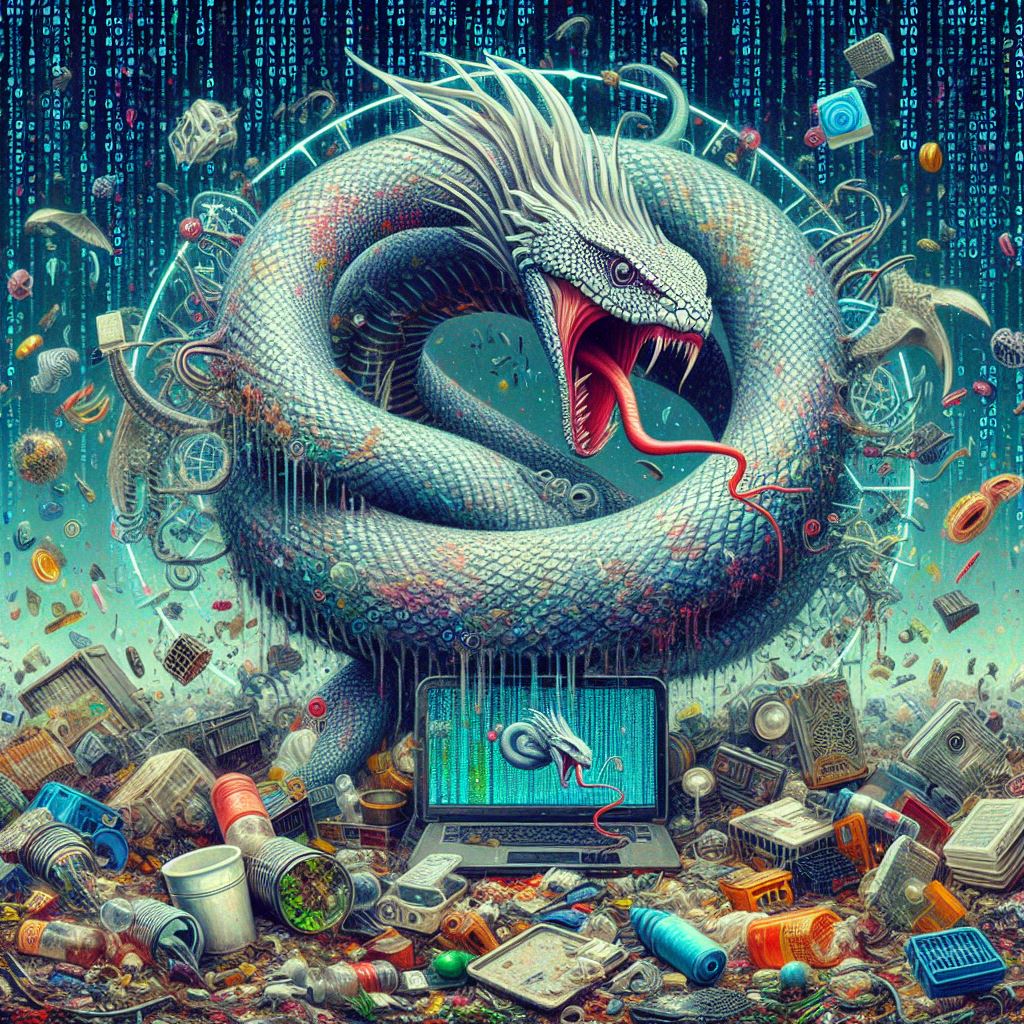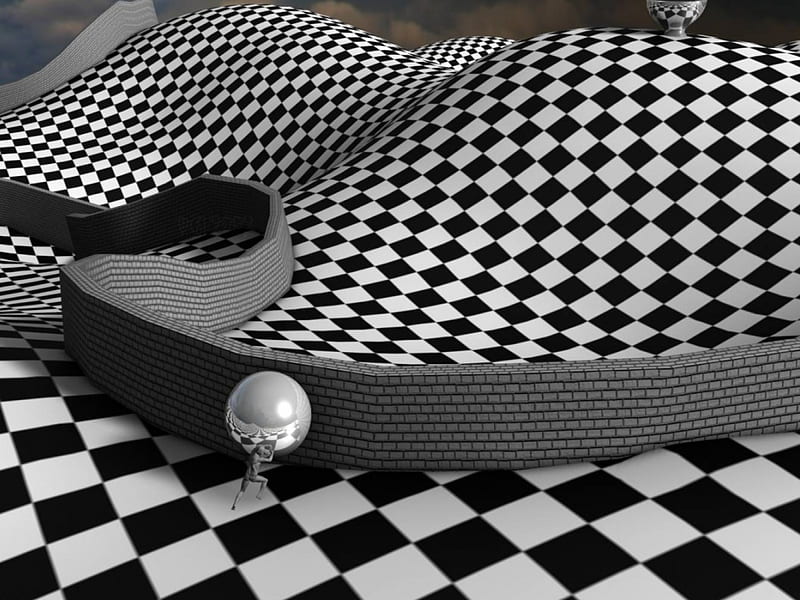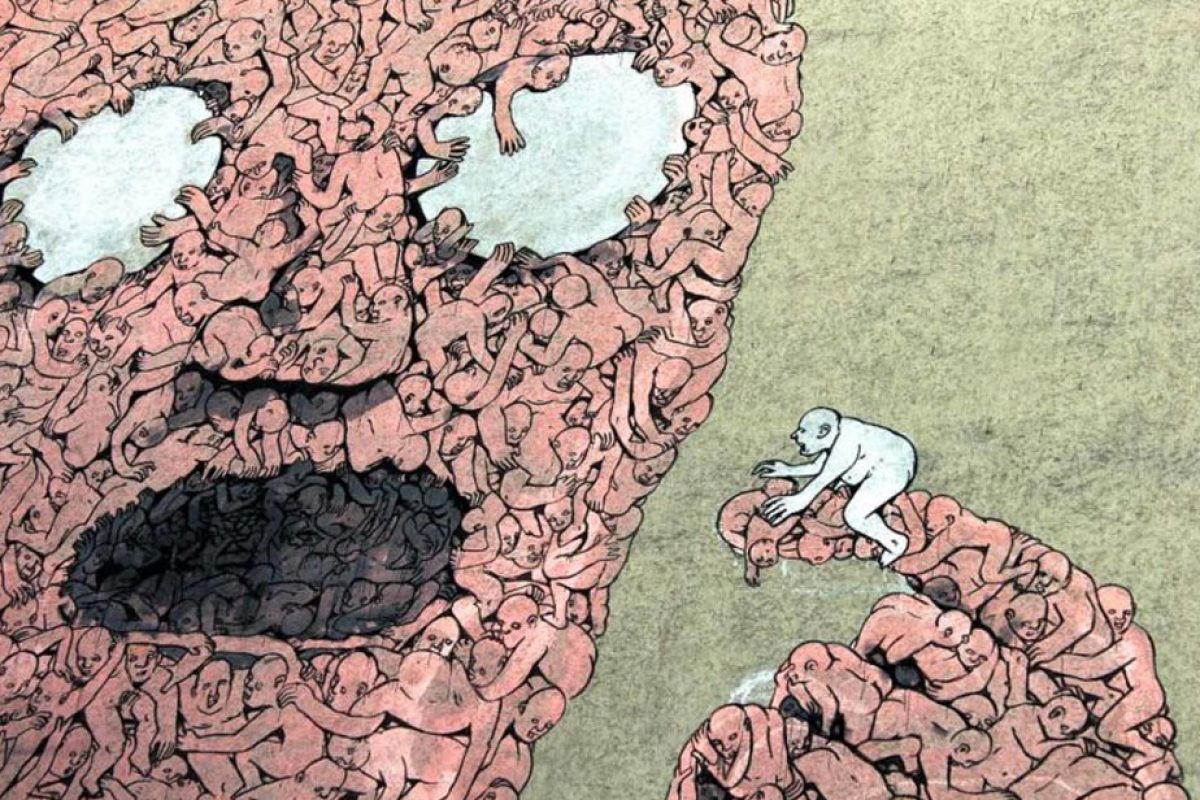The life that is lived through the thinking mind is not really life at all. The life that we live via the thinking mind is pure conflict, as Krishnamurti says. The life that we live via the thinking mind is ongoing conflict and struggle; it is ongoing conflict and struggle until the TM finally gets its way but because it never does get its way (in the final kind of way that it wants to) the conflict is ongoing forever! It is non-terminating conflict, it is unending frustration. It is not a good situation!
Life can contain conflict of course, but that doesn’t mean that it is conflict. That would be a very different kettle of fish. This is a basic principle – James Carse is alluding to this principle when he says that whilst the Infinite Game can contain any number of finite games, this can’t work the other way around. We can approach this from a somewhat different angle by saying that no matter what thoughts may go through our head, none of them are going to tell anything about the space in which the thinking occurs. Space is beyond anything that thought can assert. ‘Conflict’ can never lead to anything else but more conflict (as we have said) and that ongoing conflict (the ongoing conflict of thought) is freely allowed by space, with no restrictions at all. Space is larger than the ‘yes or no’ logic of our thoughts, therefore. Space is greater than any of the structures we might find within it, just as freedom is ‘greater’ than any rule that we might choose to either obey or rebel against. We can say this because of the point that we have just made, which is that whilst space can contain structure, structure can never contain space (or because whilst freedom can allow rules, no rule can ever allow freedom).
Thought is facilitated by space, supported by space, allowed by space but thought – for its part – doesn’t just ‘not facilitate’or ‘not support’ space, it actively tries to close it down. This is the ‘aggression’ of thought; the aggression is precisely that it is always trying to close space down. When we attempt to close space down with our thinking what we’re trying to do here is to obtain a type of ‘peace’ for ourselves – we’re trying to resolve all the conflict (the interminable conflict) and thus bring about the peace that we imagine will come once we successfully resolves all our problems. So although thought equals conflict itself, and space equals peace (i.e. the profound absence of all conflict) thought’s agenda is always to bring about peace by extending itself out indefinitely in all directions and thereby ‘closing down space’. This of course doesn’t any sense at all when we put it like this, but – all the same – this is the logic that we will buy into every day. This is why we invest in thought as much as we do; this is why we are so happy to go along with thought as it ‘does its thing’ and shuts down space. We have clearly been convinced by this logic, however twisted or back-to-front it might be. Batshit crazy though the logic might be, we are right behind it. We’re behind it all the way!
Thought’s argument is simple: ‘There are lots and lots of very serious problems out there,’ it tells us, ‘but I can solve them for you and then there will be glorious peace for all to enjoy.’ This argument definitely seems to make sense, and because are all driven by fear (because we are all driven by ‘the universal existential dread of wide-open spaces’) we are very clear quick to accept it at face value. We sign wherever it is that we’re supposed to sign, and we sign in a great big hurry too! Thought is lying to us however because delivering peace is the one thing it most certainly can’t do! All it can do is deliver itself and itself equals conflict, as we keep on reiterating. But it’s not that thought is deliberately lying, lying as part of some overall plan to cause us harm – from thought’s POV it’s doing the right thing. Thought is an engine for solving problems and that’s all that is trying to do. ‘Solving a problem’ means bringing everything to a state of final resolution and nothing will do apart from this; it’s all or nothing, so to speak. This is a very black-and-white situation – either matters are brought to a ‘final resolution’ (which equals ‘solving the problem’) or matters are left unresolved, which means that we have failed to solve the problem. This approach works well for the discreet, pragmatic problems that arise in our day-to-day lives, but it doesn’t work for the ‘big problem’ of what to do about life – which isn’t actually a problem at all, of course…
Thought tries to solve the big existential problem by knowing everything, by encompassing everything, by being familiar with everything, by putting itself in the position of being able to explain everything. This is its ‘solution to life’. Thought’s solution to life is to turn it into something that isn’t life, and this – needless to say – isn’t exactly what you would call ‘the greatest solution ever’! We’ve solved the ‘problem’ of life by getting rid of it – how wonderful! What a masterstroke – the applause is deafening… When all space has been shut down then we end up secluded in the ‘sanitised version of life’ that thought provides us with (the version of life which isn’t life at all, as we have said) the deal is that we are kept busy with the need to be continually solving all the petty tasks that thought sends our way, with an ultimate view to ‘getting rid of all problems’. We work away obediently on the treadmill therefore. This isn’t ‘living’ however – it is activity that supposedly leads to living. We play finite games in order to live, not as part of our living, to paraphrase James Carse. We put up with the drudgery (wearisome as it might be) because we know that it’s all in a good cause. We put up with it because it’s the right thing to do; we put up with it because we are obedient. We are obedient to thought – we are obedient to thought in all things, we are obedient to thought morning, noon and night in the fond belief that our obedience will get us somewhere.
The more we walk the path that is being mapped out for us however the further life recedes. We aren’t getting closer to life (as the positive thinking folk never tire of telling us we will do with all our goal-orientated activity), we’re getting further and further away from it. We are becoming more and more wooden in ourselves the whole time, more and more ossified in our outlook; our viewpoint has narrowed down narrowed down so very much that we don’t really know what life is any more – we have confused life with our well-worn daily routines (which are actually ‘life avoidance’ not life. Our horizons are too circumscribed allow us to have any sort of relationship with life anymore, nor miss the relationship that we have lost. We are ‘starved of meaning’ but we don’t know that we are: we think that the meaning of our lives lies in fulfilling the tasks that thought throws at us; we think that the meaning of our lives is somehow to be found in our rationally-conceived goals. This is such a peculiar thing – we actually believe that the meaning of life is to be found in the pursuit of our rational goals! There is nomeaning in our rational goals, nor in our perennial purposeful striving towards them; the only meaning here is what we might call false meaning – the false meaning of thinking that we’re getting somewhere when actually we are getting nowhere, the false meaning of thinking that we’re ‘progressing’ when actually we’re on the treadmill, going nowhere in a hurry…
Putting thought in the driver seat always means that we end up inhabiting a banal ‘known’ world – the banal ‘known’ world of our everyday routine-driven lives which is not actually life at all. We are all in this situation – this is the default, this is what we keep coming back to. Space has been shut down and so – inevitably – this is where we find ourselves. We are in Joseph Campbell’s ‘playpen for adults’; we have ignored ‘The Call to Adventure’ and we are sticking to what seems safe. We’re going to make the best of this playpen, this sanitised version of life, and validate it as best we can. We have no stomach for the Hero’s Journey, after all! We are pretending that the Hero’s Journey is something else – we’re pretending that the Hero’s Journey is to be forever rearranging the toys in our playpen! Society provides us with this utterly dismal ‘generic’ way of life; this generic way of life where we think and do the things that we have been told to think and do. We then tell ourselves that this is what life is supposed to be all about. We tell ourselves that we are doing splendidly – we present ourselves with awards and prizes and commendations for ‘exemplary efforts that have been made in living the generic life’ (the generic life which is no life).
Our way of knowing whether we are living well or living correctly is by comparing how we are getting on with the standards or benchmarks that have been set by society. When we hit the benchmarks or attain the standards then we know that we have been successful – we can tick the box and rest on our laurels. We will then obtain the approval and acceptance of all the people who have also tacitly agreed that ‘life is what society tells us that it is’ – as if this is going to do us any good! Life (when we are adapting to the social construct of reality, when we are neatly fitting into the Virtual Compulsive Environment) has become ‘movement towards the known’ – getting closer to the known, getting closer to the ideal, is what all the prizes and commendations get given out for, after all! We grow into what is expected of us, in other words. But ‘the journey towards the known’ is not the journey of life; it’s the journey toward something else entirely – it’s the journey towards some pale parody of life, some frightful mockery of life. Not only is this ‘rational parody’ of life hollow and devoid of any true meaning (rich though it might be in false meaning) also has (as we might expect) another quality or character to it and that is the quality or character known as suffering.
We gravitate unfailingly towards suffering, like moths to a candle flame, like lemmings to a cliff edge. Our way of life is tilted towards suffering; it contains an inescapable gradient towards suffering, and anyone who tries to tell you otherwise is ridiculously deluded! To a certain degree, the pain or unsatisfactoriness that is inherent in the surrogate version of life act as fuel for the activity that makes it up. Our motivation to get from ‘where we are now’ to ‘where we want to be’ is the motivation to escape from pain, or escape from discomfort. The attractiveness of the rational goals that the thinking mind dangles in front of us in order to spur us into action derives from the promise that they carry, which is that they will ‘improve our situation’. Our situation always needs improving and so we are always kept busy! The degree to which we don’t suffer from the sterility, isolation, alienation and meaninglessness inherent in the social game is the extent to which we are our life exists outside of it, the extent to which we are not defined by it. We are only ‘mentally well’ to the extent to which we are not playing the game. If however we were to ‘go the whole hog’ in our search for the false resolution that thought (or society) is offering us then we would find out something very interesting. Instead of some sort of thought-created nirvana or paradise we would find ourselves in a hell, pure and simple. This isn’t mere hyperbole – hell isn’t a place – it’s a state of being and when space is shut down completely this unhappy state of being is what lies in wait for us. We will then find ourselves in the neurotic hell-realm of non-terminating conflict and frustration, the realm in which it is our very attempts to help ourselves that cause us so much suffering…
Image taken from: shoreditchstreetartours.co.uk






